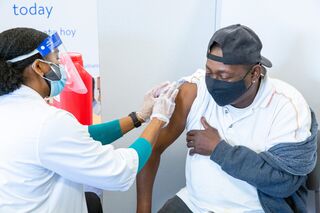False Memories
Bridging the Moral Divide Over Vaccinations
The importance of trust in an era of "fake news."
Posted February 23, 2022 Reviewed by Gary Drevitch
Key points
- Institutional distrust is central to both Covid-19 disinformation and anti-vaccine protests.
- Moral outrage, double standards in censorship and public health restrictions, and mass social media deplatforming have exacerbated distrust.
- Moral Foundations Theory helps explain differences in vaccination rates.
- Walmart has found a way to restore trust and deliver vaccines in communities with high levels of hesitancy.
This post was co-written by retired U.S. Army Brigadier General Loree Sutton. General Sutton is a psychiatrist, public health physician, and founding commissioner of the New York City Department of Veterans’ Services.
In early 2021, our research at the Network Contagion Research Institute (NCRI) indicated that institutional distrust was central to both Covid-19 disinformation and anti-vaccine protests. Conspiracy theorists’ distrust of institutions was reinforced by politically tinged double standards in both censorship and public health restrictions, and was deepened by mass social media deplatforming. To make matters worse, when people have a sense that institutions don’t trust them, it is only natural for them to lose trust in those institutions — and when the government mandates vaccines, it tends to communicate a lack of trust in individuals. This creates an environment even more ripe for conspiracy theories.
Despite unprecedented effort and cost, the Covid-19 vaccination initiative has failed to win over significant portions of the American public. And now the problem of trust has become a true moral divide. Moral outrage from Democratic politicians and pundits is directed not just against the unvaccinated, but against anyone unwilling to condemn them. At the same time, vaccine and mask mandates as well as school closures elicit moral outrage from Republican politicians and pundits directed against anyone who supports such measures.
Recent research by Karimi-Malekabadi et al. indicates that vaccine reluctance can be predicted using moral foundations theory (popularized by social psychologist Jonathan Haidt in his bestseller, The Righteous Mind). The theory proposes five universal foundations of “intuitive ethics”: Care/harm; Fairness/cheating; Loyalty/betrayal; Authority/subversion; and Sanctity/degradation. In counties with high levels of reliance on the moral foundation Sanctity/degradation, researchers found lower rates of vaccination. In counties with high levels of reliance on the moral foundations Loyalty/betrayal and Fairness/cheating, researchers found higher vaccination rates.
The Network Contagion Research Institute successfully replicated that study, finding that moral foundations scores predicted vaccine uptake and reluctance. These findings persist even when controlling for conservatism and other socio-economic and political indicators of reluctance using the Covid-19 Vaccine Coverage Index (CVAC), a tool that captures community-level barriers to Covid-19 vaccine uptake. (Higher CVAC scores are associated with lower vaccination rates.)

The NCRI, with cooperation from Walmart, examined vaccination rates in hesitant communities. The data revealed that Walmart has over-performed in vaccine distribution across different communities and moral concerns — not through using moral reprove or coercion, but by meeting people where they are. In fact, a high score on the CVAC index for vaccine reluctance, usually a prediction of low rates of vaccination, predicts success for Walmart’s distribution. In other words, Walmart is successfully delivering vaccines to people in counties with high levels of reluctance. And although the more politically “conservative” (as defined by the CVAC index) are less likely to be vaccinated, Walmart, which has made it a priority to reach people who “did not have a trusted relationship with healthcare," succeeds at delivering vaccinations across all the dimensions captured by moral foundations theory.
Even those who don’t trust the government, pharmaceutical companies, or public health experts, are willing to listen to people they do trust. What makes Walmart a trusted institution? A Walmart representative confirmed that those at Walmart who distribute vaccine information and provide vaccines do not dismiss individuals’ concerns. They do not demean or belittle the unvaccinated. They do not treat them as ignorant, arrogant, selfish, stupid, or crazy. They approach them with concern and compassion, and treat them with dignity and respect. And they don’t just talk; they also listen.
In the virtual worlds of news and social media, pundits have called for a national divorce. Rather than seeing one another as fellow citizens engaged in a mutual project of perfecting our very imperfect union, pundits on the Left view those on the Right as fascist conspiracy theorists and enemies of the state, while pundits on the Right see those on the Left as fascist authoritarians and enemies of the people.
In the real world, the story looks very different. Civil rights activist William Stringfellow wrote that listening is an act of love. Walmart’s success might be a good indication that what we need is not a national divorce. What we need is national marriage counseling.
To read the full report, click here.
Dr. Paresky's opinions are her own and should not be considered official positions of any organization with which she is affiliated.


